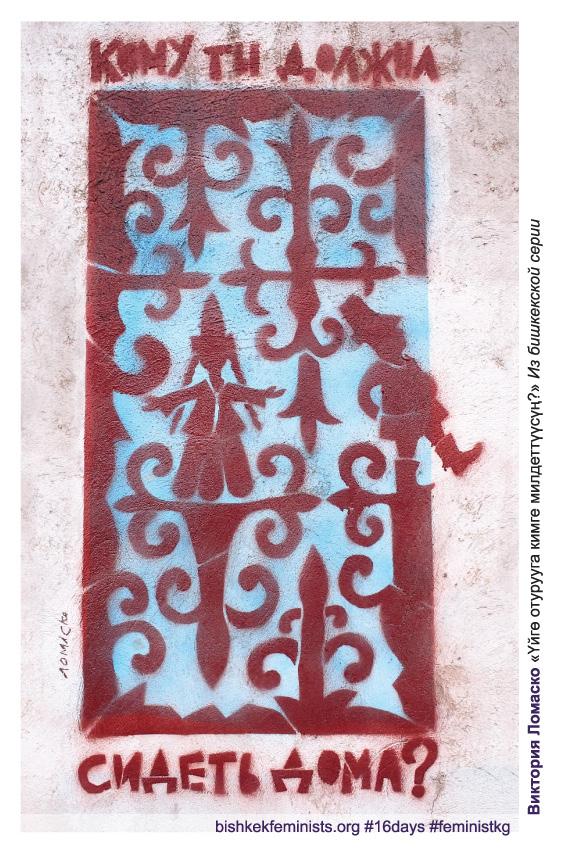
4 minute read
You’re just a kelin
Aizat
BFI team, 2014 – spring 2019, Bishkek
Advertisement
“International Day for the Abolition of Slavery is commemorated on December 2nd every year. Here in Kyrgyzstan, this day should also be celebrated as the Day for the Abolition of Kelinization, which is basically slavery. Of course I wasn’t wearing shackles and chains, but I felt locked up. Every step outside of the house was allowed only with the permission of several family members. They expected me to work 24/7. I was forced to do this, because I kind of voluntarily and without compensation agreed to labor exploitation. I became a kelin. On top of this all, I had to quickly get pregnant, give birth, and get back to work,
“A village woman is always burdened with work. I also grew up in the village, but I lived in the center of the village so I only had to pick apples. We didn’t have any cattle or pick tobacco like other girls. When I grew up and became an adult, the first time I felt like a village woman was when my kainzhurt 3 demanded in a very rude way that I pour tea. I was shocked by this demand, because I never all while remaining happy and well-groomed. However, having a baby brought me to my senses. I left my in-law’s house not knowing what I would do or how I would feed myself and my child. But these questions were the least of my concerns back then. I longed for freedom. Gradually, I got involved in social and political life through journalism, and soon I started to learn more about feminism through BFI’s internet initiatives. The path to liberation was set, and it continues now.”
Gulsana
Women’s Peace Bank, Nookat, Osh oblast

expected this from the family I married into. They were supposedly educated and intelligent people. My husband works in an international organization, but there was still this attitude towards the daughter-in-law, as if I were a lower being in the family. I really did not like the strict control over everything I did including how I walked around in the yard.”
Olga

Alga, Kant, Chui oblast
“Activism was a rebirth of sorts for me, because I was so psychologically oppressed at home. Before that, I had a very interesting career in science, specifically sociology. We traveled around the country conducting studies. Suddenly, I found myself in unenlightened darkness. All I had was housework [...]. I had to abandon all my aspirations and career prospects and became a village woman. I worked in the garden, baked bread, and took care of the children. Later, while participating in a forum in the city, I learned that the global women’s movement existed and got interested. I read a story about women in Africa who, despite their poverty, organized and engaged in income-generating activities to affect change in their communities. I told this story to the women in my village], and the timing was perfect. In 1994-1995, Kyrgyzstan was implementing land and agrarian reforms. Former collective and state farms were being privatized with plots being distributed among local citizens, and we noticed that women from poor families, widows, single mothers, and large families were being denied the full plots of land that they ought to receive. Filing complaints and generally complaining was not a tradition back then, so we found our first eleven women and prepared their cases and presented them to local authorities, then the district authorities, finally to the national authorities until these cases had reached the very top. Long story short, the women complainants were finally given the plots of land they were due. For us this was a truly inspiring success. It felt like we could move mountains and build communism. Things turned out to be more difficult than expected with much left to learn.
From 1994-95, we were an informal group. We would meet at someone’s house, in a store, at the post office, or somewhere of that nature. After our success, a local newspaper wrote an article about us. They called us “The Amazons of Kant” as if we were some sort of American sect battling men. Men [husbands] resisted usand did not let their wives attend our meetings. They thought we would spoil them and destroy their families.”
“My mom is the youngest kelin in the family. My dad has eight brothers and sisters, and he is the youngest. My path to feminism began when I refused to accept and struggled against what my mother was going through. The issues weren’t even within the family; they were mostly related to family-social roles. It always bothered me. My mom worked full time, and because she was a kelin, then comes back home from work and due to the fact that she is a kelin, she had to go to weddings or funerals and work there too (manual labour, household chores, cooking, cleaning), she would get sick all the time and just a few people cared for her. I also went through this in the family as I am the eldest child, there are five of us in the family. The eldest daughter. They told me that “you need to stay home, look after your sisters and brothers, clean”. We had several scandals when I wanted to go volunteering and engage in activism — I was told that I needed to stay at home.”
Elvira


IDEA, Bishkek










